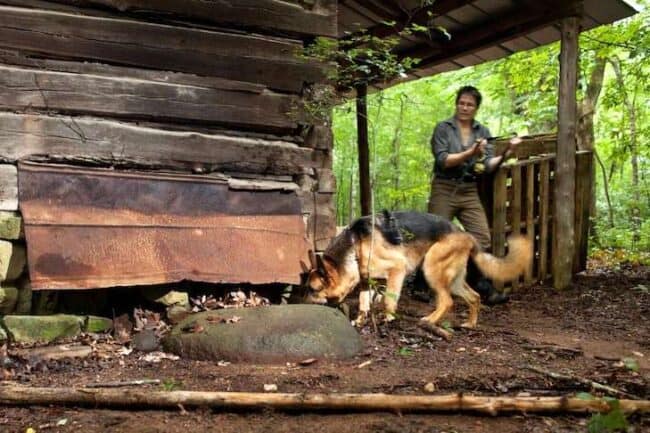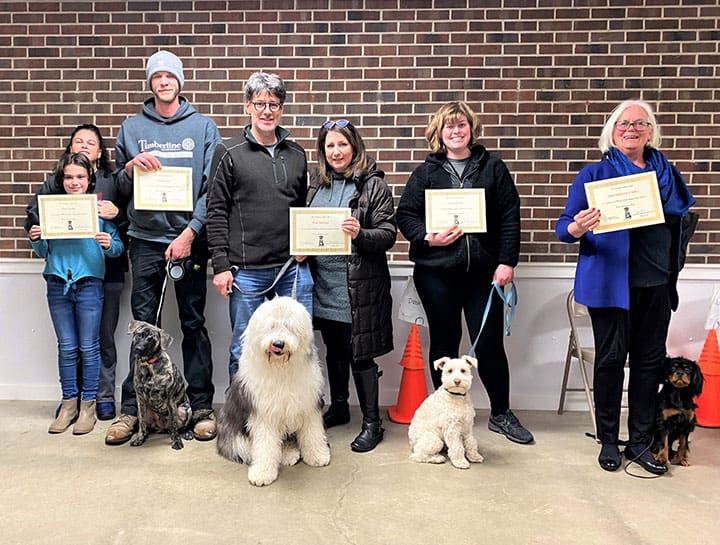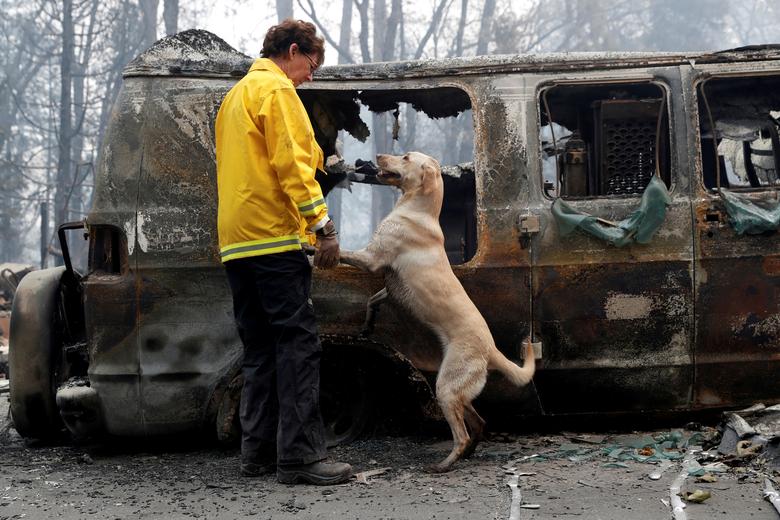Stats by the National Missing and Unidentified Persons (NamUS) show that over 600,000 people in the United States go missing every year.
About 4,400 unidentifiable bodies are discovered annually.
While a large majority of the missing persons are found quickly, tens of thousands remain missing for over a year.
Out of the 4400 bodies recovered each year, about 1000 are never identified for a year plus.
These figures are shocking, to say the least. Regardless of the loss of a loved one through crime or a natural disaster, recovering the body gives closure to the grieving family.
Cadaver dogs help recover human remains in hard-to-reach areas.
Their strong sense of smell makes it possible to detect bodies – even those that have already decomposed.
Cadaver handlers are the people behind the success of these canines.
In this post, we bring to light what these special people do and how to become one.
What Is A Cadaver Dog Handler?
A cadaver dog handler is an individual tasked with the responsibility of supervising cadaver dogs.
These are specially trained dogs that can sniff out scents of human bodies. The dogs fall under the search and rescue department of law enforcement but they are specifically used to smell dead bodies.
Whether the body is recently dead, decomposed, or drowned, a cadaver dog should be able to detect it. Learn more about these dogs here: All About Cadaver Dogs
Handlers work hand in hand with such canines and are able to interpret different signals that the dogs offer out in the field.
These special persons can tell when a dog throws a signal that there’s the possibility of human remains.
They will then write a report of the search to be submitted to law enforcement authorities.
What Does Cadaver Dog Handler Do?

The job description of a cadaver dog handler is quite varied. Some of the responsibilities of a cadaver dog handler include the following:
I.
Supervise the dog during the human-remains detection process.
They guide the dog on where to go and look within a building, lake, or any other alleged crime scene.
II.
Read and interpret dog behavior to decide if a dog is communicating something meaningful or not.
Cadaver dogs are highly trained to ignore everything else and only signal when they can smell human remains. That means even if they came across the remains of another pet, they will not be moved.
Only when they discover a scent that matches that of a decomposing or fresh human body will they alert the handler. Handlers are responsible for picking these cues.
III.
Write a detailed report on every case the dog discovers effective leads o crime scenes or in the event that a body is actually discovered.
The documentation should be thorough and precise as it is an important document in court where there’s a report of a missing person.
The report is turned over to the appropriate law enforcement officers.
IV.
Provide basic care for the dogs.
Handlers also ensure that the cadaver dogs they are responsible for have a shelter, a warm place to rest, food, and exercise.
They also have to groom the pups, take them out to pee and poop, and basically monitor them to make sure they perform their best at all times.
V.
Stay up-to-date with cadaver dog training to make sure that he can accurately detect human remains and give the correct signals.
How Much Do Cadaver Dog Handlers Make?
According to Indeed.com, a K9 junior dog handler gets around $46.8K – $59.2K a year.
Zip Recruiter puts the figure at an average of $35,662.
The latter is the range for a detection handler where a cadaver dog handler falls into.
Based on these sites’ averages, it is safe to assume that the specific wage of a cadaver handler falls in these ranges.
If you go up the scale, your salary will certainly increase.
How to Become a Cadaver Dog Handler

Dog handlers have a very crucial task of providing evidence that would otherwise be difficult to retrieve.
As such, they need a high training level and commitment to be good at what they do.
Here’s how to become a cadaver dog handler.
1. Get Some Education
Getting a degree isn’t compulsory for a cadaver dog handler but it reinforces your resume and opens up more opportunities than you ever dreamed of.
You want to get a Bachelor’s or Associate degree in Criminal Justice to prepare you for the world of law enforcement.
Consider other fields such as animal science, customs inspection, and wildlife inspection as well.
Choose a career and institution that prepares you adequately. Ask if they have visits to the field for students and internships before the end of the degree.
2. Get Trained
Training is hands down the most important factor of being a cadaver dog handler.
There are many ways of doing this:
First, join the police academy training in order to get into the police force. This program typically lasts about six months and exposes you to lots of topics such as firearm safety, laws and regulations, self-defense, and other techniques used by the police.
After the training, you can gain some experience in the field and start out as a law enforcement professional.
After doing police officer training, the next thing to do would be to start your training as a cadaver dog handler.
Apply to a K-9 unit for the best form of training. The process starts with an interview, a medical exam, and physical requirements.
If you pass, the organization will also check the dog(s) that you have to ascertain that you are a good fit for them.
Once you join the K-9 unit, you will start your training about canine behavior, search techniques, dog signals, and other methods that come in handy when using dogs to detect human remains.
After you are sufficiently trained, you will start practicing with your dog (s) regularly to test out your skills in the field.
K-9 teams have opportunities of showcasing their skills to the general population. There are prizes given to the winners.
3. Get Certified
Handling a cadaver dog needs lots of ongoing training. As a result, it is a good idea to be certified as a handler.
Despite dog handling training, you might also want to enlist other relevant organizations to get the necessary training and certifications.
If you already work for a dog handling company, you may encounter training internally or outside.
Either way, getting certified further prepares you for the all-important role of being a cadaver dog handler.
You will be offered tests to test whether you can work with your dog to uncover hidden bodies.
Tips To Be More Successful In a Cadaver Dog Handler Position
Like other careers, there are average and top-notch cadaver dog handlers.
What distinguishes one from the other is a commitment to become better by doing the following.
A. Carry On With Ongoing Education and Training
Education doesn’t stop after training and certification.
A good dog handler knows that things in the field change. Laws and regulations are updated. Criminals get smarter every single day.
Refreshing your knowledge of canine behavior, signals, police training, and other facets that come in handy in your career puts you on top.
B. Gain a Better Understanding of Human Decomposition
Handing and training a dog to detect human remains requires familiarization with the process of decomposition and how it affects cadaver dog training.
You need to understand when a body first starts to decompose right after death, when body mass begins to be lost, and when the dry phase reaches.
Learn the elements that affect the decomposition rate such as trauma, animal activity, humidity, insect activity, and more.
Keep abreast with human decomposition to stay on top of your career.
Parting Thoughts
If you love working with dogs and don’t mind uncovering dead bodies, a career in cadaver dog handling is up your sleeve.
It is certainly not an easy or comfortable field but with the right attitude and training, it is a rewarding job.
You get to be a part of solving crimes and giving families closure after losing their loved ones.
Very few people have a chance to do this in their lifetimes.
As an Amazon Associate, we may receive a small commission from qualifying purchases but at no extra cost to you. Learn more. Amazon and the Amazon logo are trademarks of Amazon.com, Inc, or its affiliates.

